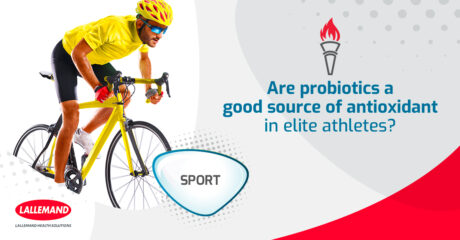
Article 3 of 4. As the Tokyo Olympic games are well underway, we offer you a series of articles based on the four demonstrated modes of action probiotics can play for athletes to optimize their wellbeing [Jäger 2019], as recognized by the International Society for Sport Nutrition (ISSN). These four effects of probiotics are:
- boost natural defenses
- maintain gut barrier integrity
- improve antioxidant capacity
- decrease occasional stress through the brain-gut axis
What are antioxidants?
Antioxidants are molecules present in the body that fight free radicals, a natural by-product of aerobic respiration. It is true that free radicals are often portrayed negatively, but they also serve important health functions. For example, certain immune cells use free radicals as an offensive strategy, whereby the release sacs of free radicals at their target, letting the free radicals destroy the target’s biomolecules. Like in many other health matters, it all comes down to finding a certain balance of free radicals and antioxidants. Whilst the body has its own antioxidant defenses to send free radicals away through enzymatic activity, some fruits (small berries for instance), vegetables (kale, red cabbage, artichoke), green tea, coffee, and dark chocolate contain high levels of naturally occurring antioxidants, such as vitamins C and E. Although the body has its own way of dealing with free radicals, the fact that this happens in situ by aerobic respiration means that there is always a constant supply of free radicals that must be dealt with. In addition, several lifestyle aspects such as diet, stress, and environmental factors are known to promote excessive free radical formation and oxidative stress, including air pollution, cigarette smoke, alcohol intake, and intense and prolonged exercise.
Are antioxidant supplements necessary?
Dietary intake of antioxidants is essential for optimal health and should ideally come from a variety of antioxidant-rich whole food. Studies indicate that foods reduce oxidative damage to a greater extent than supplements, and results suggest that foods’ compounds work synergistically. However, low-dose supplements, such as multivitamins and specific probiotic strains, may be beneficial for active people, who already follow a healthy food diet, but given their increased energy requirements (supplied by aerobic and non-aerobic respiration), dietary supplements may be able to provide them with an extra bit of antioxidants.
Health Canada confirms LAFTI® L10 antioxidant potential
Lallemand Health Solutions has gained new indications from Health Canada for its documented EXPERT’Biotic™ L. helveticus Lafti® L10 recognizing its antioxidant properties, with a specific focus for athletes’ health. Lafti® L10’s new Canadian health claims confirms its antioxidant potential: “Source of antioxidant probiotic and “Source of antioxidant probiotic in elite athletes”. As far as Lallemand Health Solutions is aware, these new claims, supported by a recent post-hoc paper of Marikovic et al. [Michalickova 2018] have not been attributed to any other probiotic strains and are an addition to the previously approved indications for Lafti® L10, which has shown the ability to boost natural defenses in physically active adults and to promote gastrointestinal comfort in athletes.
Lafti® L10 is the all-time champion to support a healthy body and mind, essential to sport performance.
References:
